Question: 1 0f 3 Simple Pendulum Pu rp 050 1. To study the simple pendulum and how the period time, T relate to the Length, L
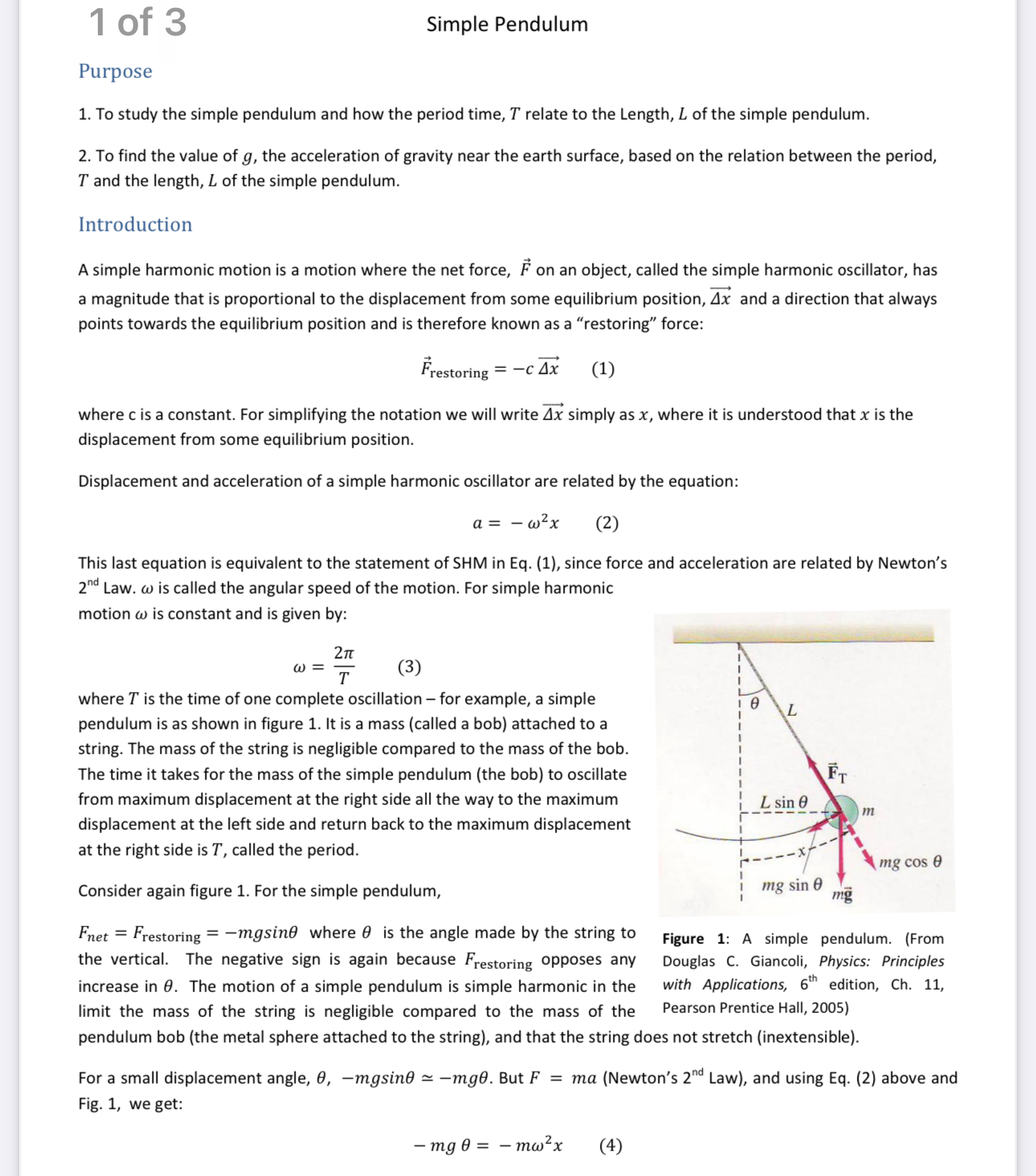
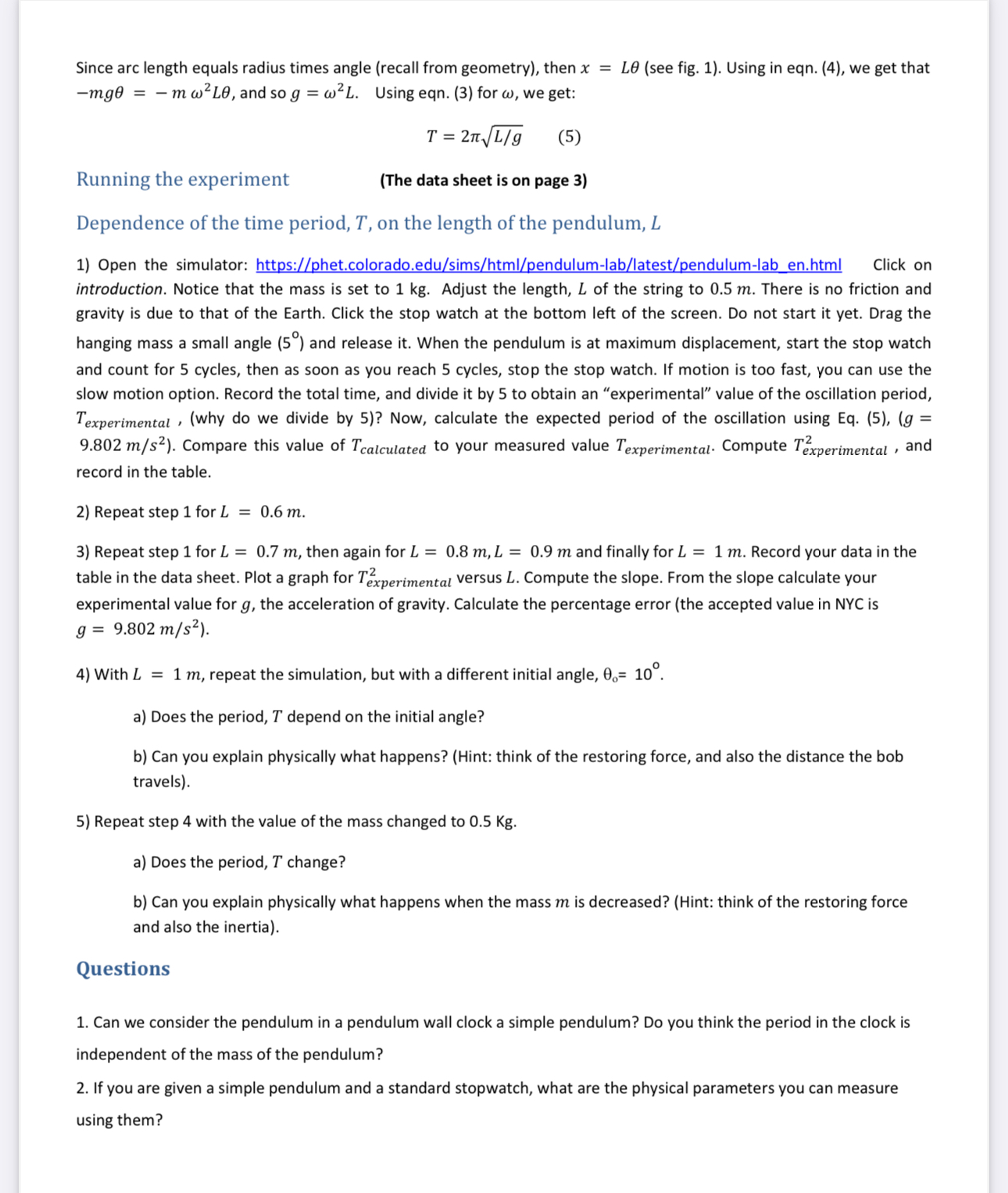
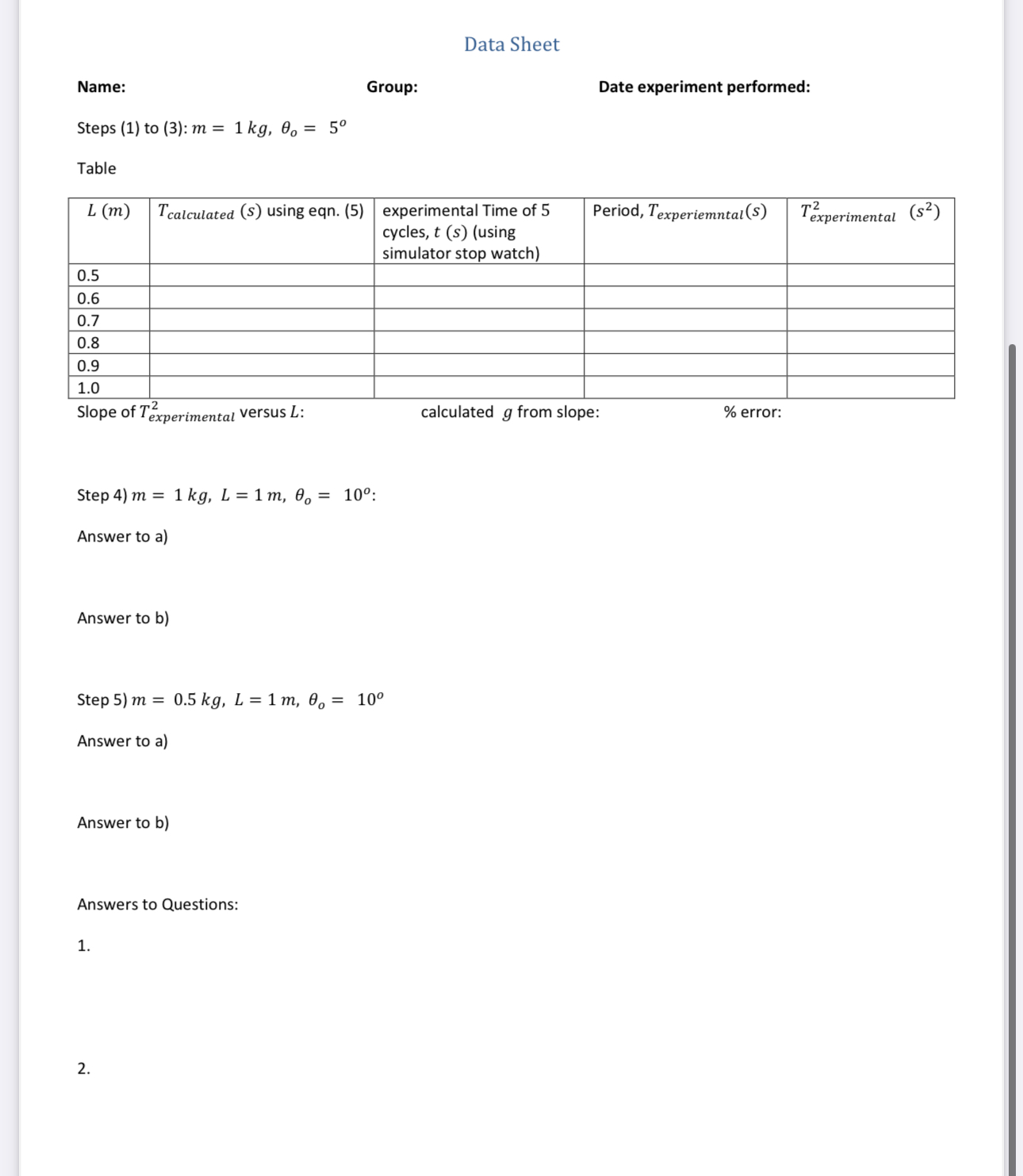
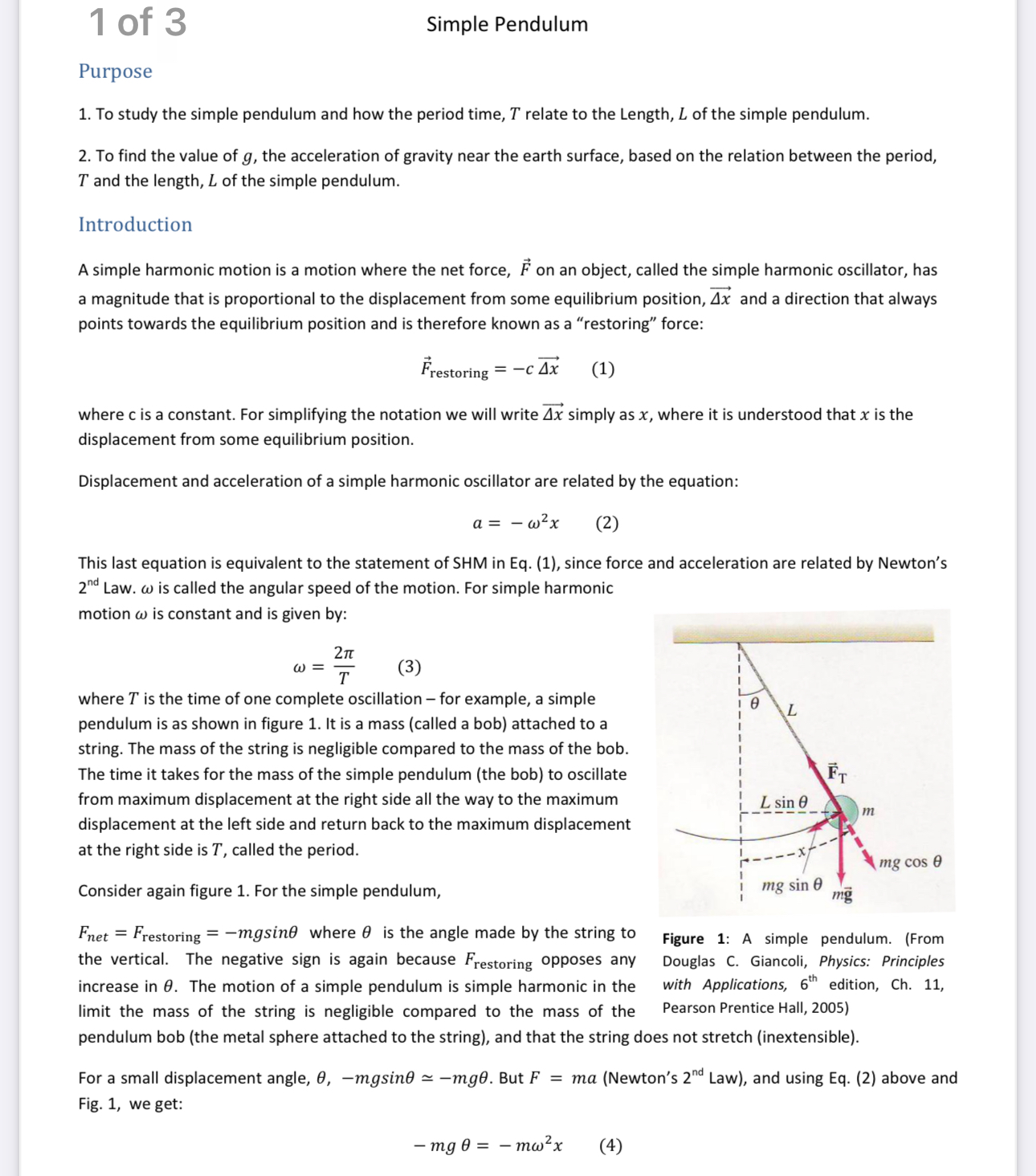
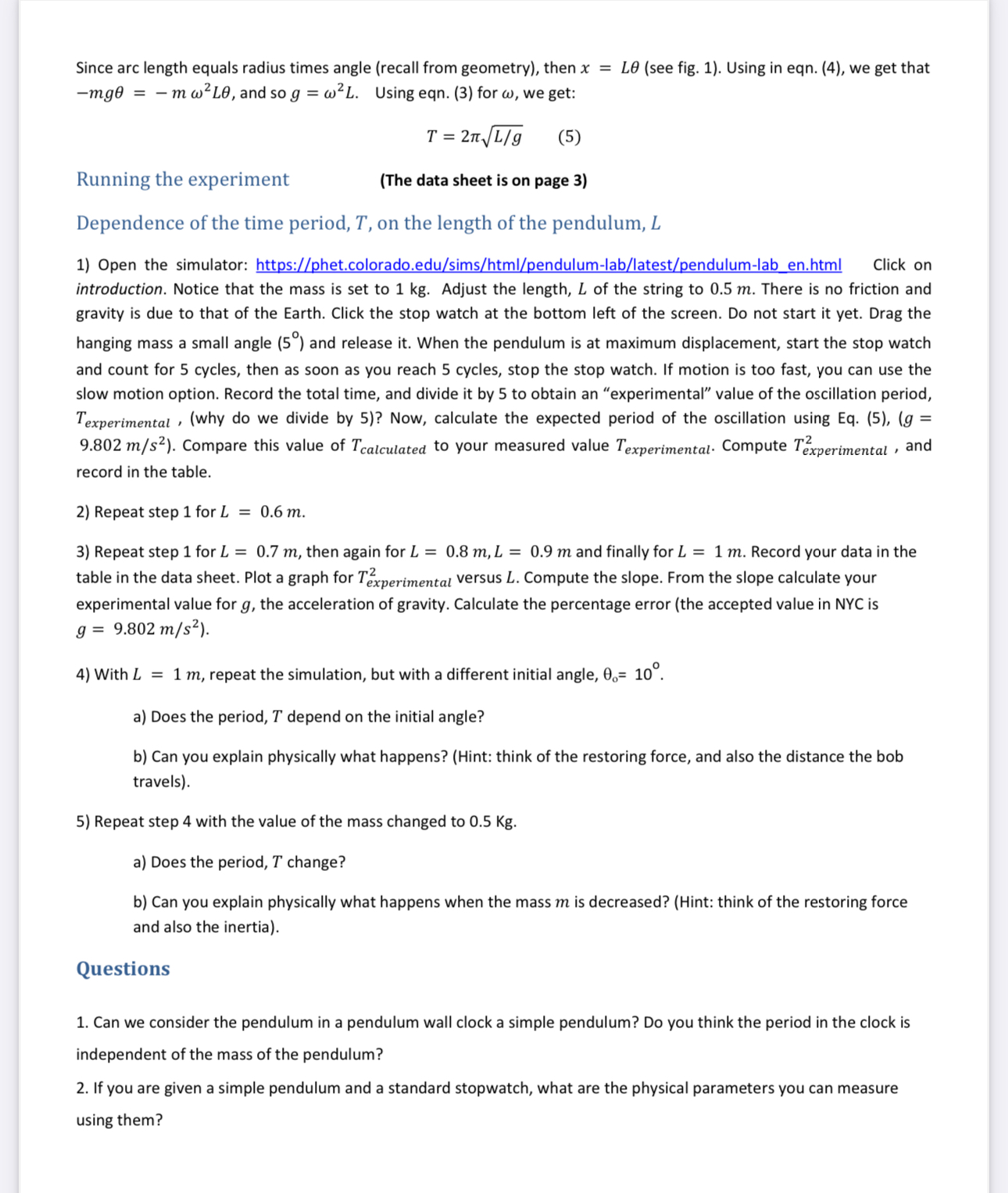
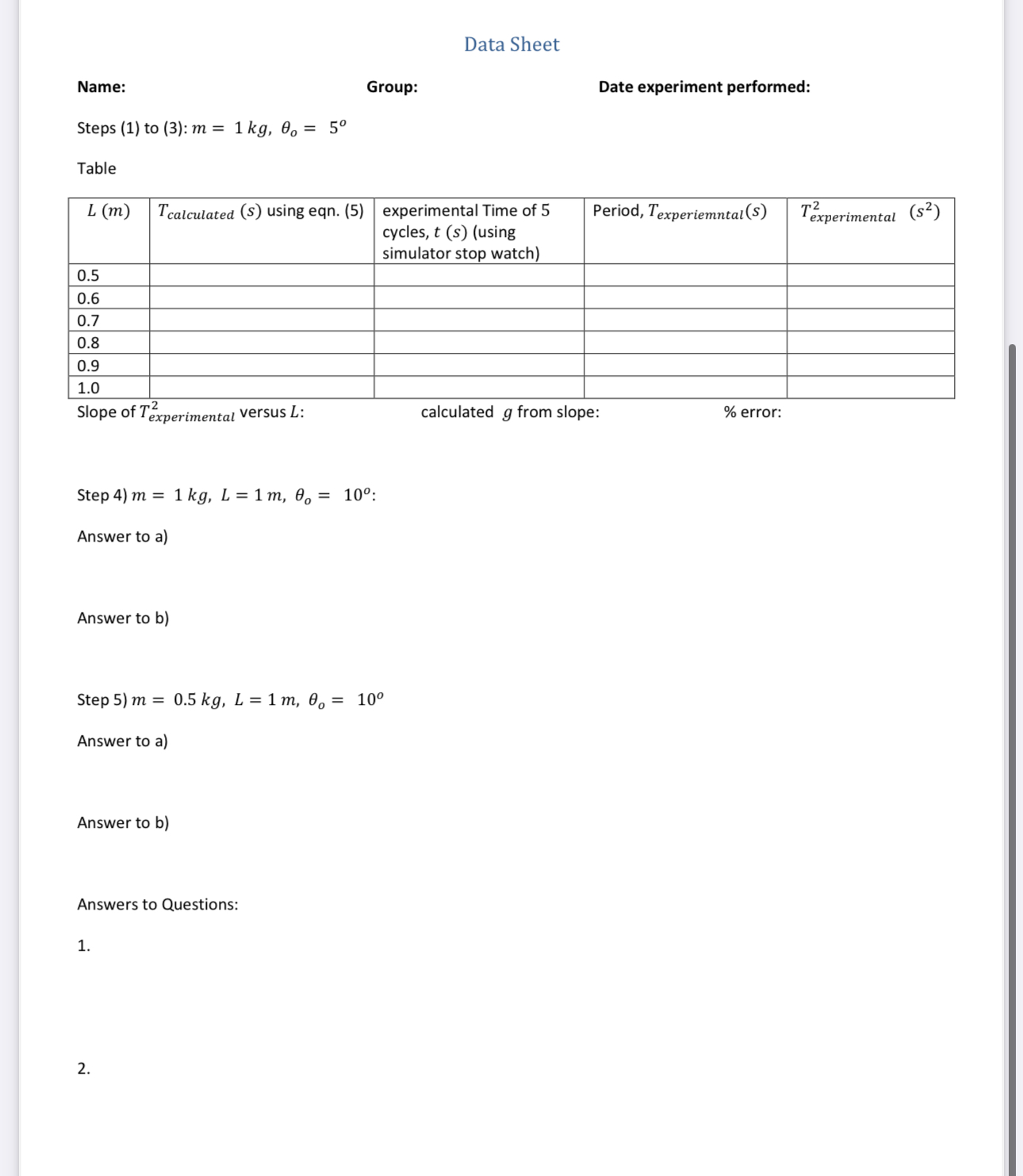
1 0f 3 Simple Pendulum Pu rp 050 1. To study the simple pendulum and how the period time, T relate to the Length, L of the simple pendulum. 2. To find the value of g, the acceleration of gravity near the earth surface, based on the relation between the period, T and the length, L of the simple pendulum. Introduction A simple harmonic motion is a motion where the net force, F on an object, called the simple harmonic oscillator, has a magnitude that is proportional to the displacement from some equilibrium position, Er. and a direction that always points towards the equilibrium position and is therefore known as a "restoring\" force: restoring = C' E; (1) where c is a constant. For simplifying the notation we will write EE simply as x, where it is understood that x is the displacement from some equilibrium position. Displacement and acceleration of a simple harmonic oscillator are related by the equation: a = wzx (2) This last equation is equivalent to the statement of SHM in Eq. {1), since force and acceleration are related by Newton's 2"'1 Law. to is called the angular speed of the motion. For simple harmonic motion a; is constant and is given by: 2rr . M? (3) : where T is the time of one complete oscillation for example, a simple pendulum is as shown in figure 1. It is a mass {called a bob) attached to a string. The mass of the string is negligible compared to the mass of the bob. The time it takes for the mass of the simple pendulum {the bob] to oscillate from maximum displacement at the right side ail the way to the maximum displacement at the left side and return back to the maximum displacement at the right side is T, called the period. mg sin 3 Consider again figure 1. For the simple pendulum, mg Fm, = Preston-Hg = mgsin6 where 9 is the angle made by the string to Figure 1: A simple pendulum. (From the vertical. The negative sign is again because Preston-mg opposes any Douglas c, Giancoli, Physi'cs; Principfes increase in 9. The motion of a simple pendulum is simple harmonic in the With Applications. 51" Edition, Ch. 11. limit the mass of the string is negligible compared to the mass of the Pear-"0\" Prentice \"3":2005) pendulum bob {the metal sphere attached to the string}, and that the string does not stretch {inextensible}. For a small displacement angle, 6, -mgsin6 z mgl. But F = ma {Newton's 2"d Law), and using Eq. {2} above and Fig. 1, we get: mg 6 = mwzx (4-) Since arc length equals radius times angle (recall from geometrvl, then x = L6 (see fig. 1). Using in eqn. {4}, we get that mgB = m wZLS, and so 9 = (1121.. Using eqn. {3) for to, we get: T = 211' My (5) Running the experiment (The data sheet is on page 3} Dependence of the time period. T. on the length ofthe pendulum, L 1] Open the simulator: htt s: het.colorado.edu sims html endulum-lab latest endulum-lab en.htm| Click on introduction. Notice that the mass is set to 1 kg. Adjust the length, L of the string to 0.5 m. There is no friction and gravity is due to that of the Earth. Click the stop watch at the bottom left of the screen. Do not start it yet. Drag the hanging mass a small angle (5) and release it. When the pendulum is at maximum displacement, start the stop watch and count for 5 cycles, then as soon as you reach 5 cycles, stop the stop watch. If motion is too fast, you can use the slow motion option. Record the total time, and divide it by 5 to obtain an \"experimenta value of the oscillation period, Texpmmmm , {why do we divide by 5}? Now, calculate the expected period of the oscillation using Eq. {5), (g = I\" 9.802 m/szl. Compare this value of Tmlmmed to your measured value Taxpmmenm. Compute fopemenm , and record in the table. 2] Repeat step 1 for L = 0.6 m. 3) Repeat step 1 for L = 0.7 m, then again for L = 0.8 m,L = 0.9 m and finally for L = 1 m. Record your data in the table in the data sheet. Plot a graph for Tezxpmmemay versus L. Compute the slope. From the slope calculate your experimental value for g, the acceleration of gravity. Calculate the percentage error (the accepted value in NYC is g = 9.802 m/sz). 4) With L = 1 m, repeat the simulation, but with a different initial angle, 0.,= 10. a) Does the period, T depend on the initial angle? b) Can you explain physically what happens? (Hint: think of the restoring force, and also the distance the bob travels}. 5) Repeat step 4 with the value of the mass changed to 0.5 Kg. a) Does the period, T change? b) Can you explain physically what happens when the mass m is decreased? (Hint: think of the restoring force and also the inertial. Questions 1. Can we consider the pendulum in a pendulum wall clock a simple pendulum? Do you think the period in the clock is independent of the mass of the pendulum? 2. If you are given a simple pendulum and a standard stopwatch, what are the physical parameters you can measure using them? Data Sheet Name: Group: Date experiment performed: Steps (1) to (3): m = 1kg, 0. = 50 Table L (m) Tcalculated (s) using eqn. (5) experimental Time of 5 Period, Texperiemntal (S) Texperimental ($2) cycles, t (s) (using simulator stop watch) 0.5 0.6 0.7 0.8 0.9 1.0 Slope of Texperimental Versus L: calculated g from slope: % error: Step 4) m = 1kg, L = 1m, 0. = 10: Answer to a) Answer to b) Step 5) m = 0.5 kg, L = 1m, 0. = 10 Answer to a) Answer to b) Answers to Questions: 1. 2
Step by Step Solution
There are 3 Steps involved in it

Get step-by-step solutions from verified subject matter experts


